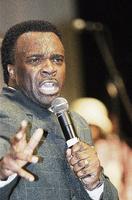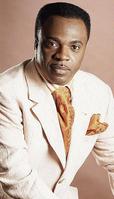Mark Dawes, Staff Reporter 

Bishop John Francis - Contributed photos
'In London most people are very critical of religion. Anything called 'religion' is a very nervous thing for people. They view it with suspicion. If someone from here was to go to England, the first thing I would say is that they need to be really versed in the Word.'
Family folklore has it that when he was one, John Francis took his first steps with a Bible in his hand. No one knew for sure where he got the Bible. Right away, his family and others began prophesying over his life that he would be a preacher.
At seven, he got saved and was baptised. The stream of prophesying continued. Some prophesied that he would not only be a preacher, but that he would be known globally.
Today, the toddler has grown up to be Bishop John Anthony Francis, a senior pastor and a globe-trotting preacher. He does a programme on the Trinity Broadcasting Network (TBN), Black Entertainment Television (BET), and several other cable channels and television stations across the world. Locally, Bishop Francis' broadcast may be viewed on TVJ and CVM.
Bishop Francis, 42, is scheduled to be the speaker at the Order My Steps conference being held today at the National Arena, in St. Andrew, beginning at 10:00 a.m. and ending at 9:00 p.m.
Bishop Francis was born and bred in London. His parents hailed from Clarendon in Jamaica. His father, now deceased, was one the pioneers of one of the first black churches in England, known as Church of God in Christ. Then his father joined up with the Firstborn Church of the Living God.
By the time he was 16, he was a preacher and heavily engaged in various forms of ministry. He was also a nationally known person as he co-hosted a weekly gospel music television programme called People Get Ready. The television station was paying him as a host, a singer and as a musician. He was a choir director and his singing group was signed to CBS Records (now Sony Music). His singers were in heavy demand all over the United Kingdom and beyond.
Father's blessings
In addition to his media, singing, and preaching ministry, Bishop Francis spent his formative years as a co-pastor of his father's church. A time came when he felt he had taken that congregation as far it could go, given its history, culture and structures. He left with his father's blessings to start another congregation in London. Initially, the church he founded remained within the denomination. But the church grew rapidly and radically. There arose tensions in the denominational hierarchy about the way this young pastor was doing ministry. Eventually, the hierarchy, which included his father, threw him out.
He started a new church about 14 years ago with 18 persons. That number grew to 150 within three months. Today, his congregation is described in church growth jargon as a megachurch. Bishop Francis is the founder and senior pastor of Ruach Ministries (Brixton, south London). With a congregation of more than 5,000 members. His church has five services on a Sunday and is served by 14 pastors. The sanctuary seats 1,400 persons and there is often a crowd waiting to get in on Sunday mornings.
West indian heritage
Sometime later, there was reconciliation between himself and the denomination that kicked him out. His father even showed up to bless his new ministry. His father, he reported, said to him, "John it did not go the way I wanted it to, but I am sure the hand of God is upon you."
His church is predominantly black. About half of the black worshippers are of West Indian heritage. He concurs with the observation that for the most part, it is the black church in the United Kingdom that is on the incline. The white churches, he said, are on the decline, largely because they have promoted religion at the expense of relationship with God.
He also concurred with the view that whereas the U.K. formerly sent missionaries to this island, Jamaica now needs to send missionaries to Britain. He offers the following advice to any Jamaican who hopes to pastor a church in London.
"In London most people are very critical of religion. Anything called 'religion' is a very nervous thing for people. They view it with suspicion. If someone from here was to go to England, the first thing I would say is that they need to be really versed in the Word. Be prepared for people to question you, for people to try to pull apart your belief. The average person there is quite informed about different religions, most of the schools don't teach Christianity. They teach religious education, which involves the study of different religions. That creates in people an open mind. You can get into nice theological debates but things only take a turn when they see the power of God coming through you. So if you are going to reach the people, they need to see the power of God.
Bishop Francis did not attend a Bible school or seminary. He got his theological training largely through the instrumentality of short-term in-house workshops offered in his local church. The subjects taught included hermeneutics (how to interpret scripture) and homiletics (how to preach). But perhaps the most far reaching of influences on him has been a relationship he has had for many years with an orthodox rabbi. The rabbi was able to help him unearth the treasures of the Hebrew language and instill in him an appreciation for the Jewish/Hebraic worldview.
Studying the scriptures for own edification
Bishop Francis said he spent a lot of time studying the Scriptures for his own edification and not merely for purposes of preaching. "I love God's Word. I don't study to preach. I really believe that I am getting a message. A message is different from a sermon. A sermon is what you put together to impress people.
A much-sought-after preacher, Bishop Francis has avoided doing major ministry in Jamaica tillnow. "I deliberately avoided Jamaica. A prophet has no honour in his own country. I wanted to make sure that I was capitalising on the other countries then my own might start to respect me ... I felt that the season was right to come here. The Lord said to me it was the season."
He was invited to Jamaica by a local church organisation. The invitation was about to be cancelled as the organisers fell into financial difficulties, he explained. But because he felt God placing Jamaica on his heart at this time, Bishop Francis still opted to come to the island and undertake all the major expenses associated with the one-day conference.
He stresses, and he and his ministry are putting into Jamaica - not taking out.
What does he hope to share with the Jamaican people today?
"There are a couple of things the Lord is kinda laying on my heart. I just feel that there is such great potential in the Jamaican people, we are quite talented. We are dispersed all over. There is some brilliance that is out there. We need to know who we are. We need to understand the things that have been set to keep us bound and to stop us from progressing. Captivity is different from imprisonment. You can be free but you can still be captive. I think a lot of people are in captivity and don't know it. They feel they have freedom, but the greatest freedom is to be freed in your mind. And understand that before an election you don't have to kill off everyone. There are better ways of communicating and doing things. That is (electoral violence) something that they (wicked persons) have engineered to do to us so that we can never progress and be in control of what we have, so we will always look to people to help us because we never feel we can help ourselves.
Unlike many of the megachurch pastors who are on television, Bishop Francis does not have a jet. He said he was offered one, but turned it down. He has no problem travelling on a private jet, especially since his ministry carries him all over the globe. But, he explained, the economics of having a jet would pose too much of a problem for various churches to handle at this time.
Purpose of preaching
Also, unlike many other television preachers, he does not travel with bodyguards in the strict sense, nor is he critical of those who have such protection. He does have people who travel with him who surround him and cover him in prayer. Having people around him, he said, is critical as the higher one's profile gets, the more he becomes a target for crazy people and persons who want to see him fall.
He also strives to keep himself accountable. He believes "every leader should have a pastor, no matter how big you are. In my city, I have two clergymen who keep me on track."
He has given the leadership at Ruach Ministries the authority to contact these two clerics if they find that he is going off course. He meets with these two clerics about fortnightly. His overall covering, is Bishop T.D. Jakes, from the Potters House church in Texas. He meets with Bishop Jakes two or three times a year.
Bishop Francis is married to wife and co-pastor Penny and they have three daughters.
More about the ministry of Bishop John Francis is available at www.johnfrancis.org.uk. Send feedback on Mind&Spirit to mark.dawes@gleanerjm.com.

